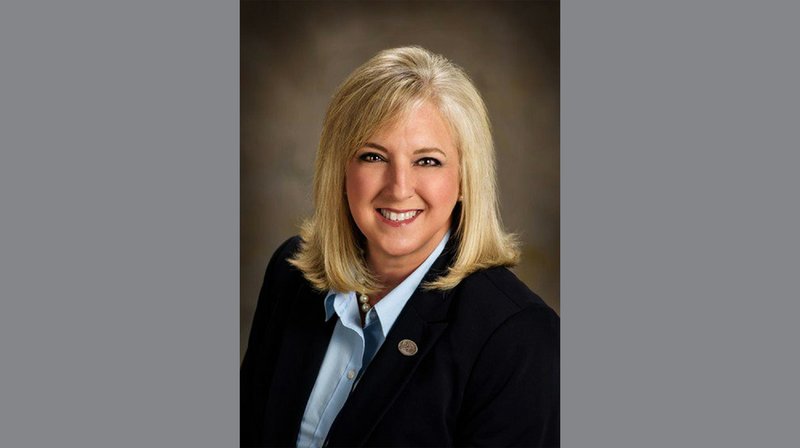The next leader of the University of Arkansas Community College at Morrilton should be a longtime staff member from the inside, University of Arkansas System President Donald Bobbitt recommended to trustees Wednesday.
Lisa Willenberg, a 27-year employee of the college, has "institutional knowledge and respect" from "key individuals internal and external to the institution," Bobbitt said in the system's announcement of his recommendation.
Willenberg, 52, has been the college's vice chancellor for finance and operations since 2011. Before that, she was an accountant for the college. She has also been an adjunct accounting instructor.
"I have seen so many changes over the years and obviously have a passion for the campus," she said.
A 16-member search committee recently recommended Willenberg to Bobbitt out of a final pool of four candidates. Those candidates visited campus and attended public question-and-answer sessions from Sept. 16 through Sept. 26.
If her hiring is approved by trustees, then Willenberg will take the helm of a college focusing on workforce training in an attempt to turn around years of sliding enrollment -- enrollment that's dropped in part because of the region's loss of the natural gas drilling industry.
When Willenberg started at the college, it was transitioning from a vocational-technical school to a two-year college.
Now, Willenberg sees three different ways the school can reach more students: by expanding technical job training, increasing access to courses that transfer to four-year schools and adding resources to its allied health programs. Those goals combine the college's historical mission of job training and its newer role as a provider of general education for transfer credits.
The search committee wanted a chancellor who could build partnerships with regional businesses and school districts, said Mary Clark, the committee chairwoman. That's basically what Willenberg has been doing, she said.
"Those are some of the most important things that I think a chancellor will be responsible for," Clark said.
Willenberg has also helped the college succeed financially despite lower enrollment, Clark and Bobbitt noted.
The college's reserves have increased, and it has "secured bonds to construct innovative campus facilities," the UA System announcement states.
Willenberg would permanently take the place of nine-year chancellor Larry Davis. He retired Jan. 31.
She would earn $180,000 annually. Her base salary for the 2018-19 year was $120,000, according to state higher-education records.
During his final year, Davis' base salary was $193,203. He also received a $10,500 housing allowance.
The college was the state's second post-secondary vocational-technical school, opening in 1963, according to the Central Arkansas Library System Encyclopedia of Arkansas. Petit Jean Vocational-Technical School became Petit Jean Technical College in 1991 and joined the UA System in 2001 to expand its resources.
Preliminary enrollment was 1,839 students this fall, 169 of them from high school.
The college's enrollment peaked a decade ago, when the student count was consistently more than 2,000. That was during the state's natural gas drilling boom, and the college had started a program specifically targeting employment in that industry.
At its height, the petroleum technology program enrolled about 500 students, Willenberg said.
After natural gas companies withdrew en masse from additional fracking in north-central Arkansas, the college put the program on hold.
In spring 2018, the college opened the Workforce Training Center, a 54,000-square-foot facility. That facility is home to the school's welding; industrial maintenance; and heating, ventilation and air conditioning programs, among others.
It was conceived in part to make up for the loss of petroleum technology students, Willenberg said. But the center extends the college's longtime efforts to tailor its programs for regional employers looking for skilled labor.
That must continue for the college to succeed, she said.
"We're in the right place at this point in time with facilities, with our financial reserves and with our quality faculty. We just need students," Willenberg said.
That center has space for more programs, and Willenberg wants to add more.
She also wants to increase simulation technology for the school's allied health programs.
People who want to become licensed nurses, for example, must have a certain number of hours of experience. But, Willenberg said, only so many hospitals, nursing homes and other facilities have clinical opportunities. That's a major part of the shortage of allied health professionals in Arkansas and the rest of the nation, she said.
On-campus simulations can help students get experience when they can't get clinical positions, Willenberg said. The college has luckily received grants in recent years that have helped it expand simulation opportunities, she said.
"With the shortage of allied health occupations in the state," she said, "we're going to have to get creative with additional simulations and clinical-type settings."
But the college is more than a job training destination.
Willenberg notes the opportunities within the UA System for students to earn scholarships when transferring to a four-year school after earning an associate's degree within the system.
The college must also expand its offerings of general education, transferable courses, she said.
Metro on 10/17/2019
